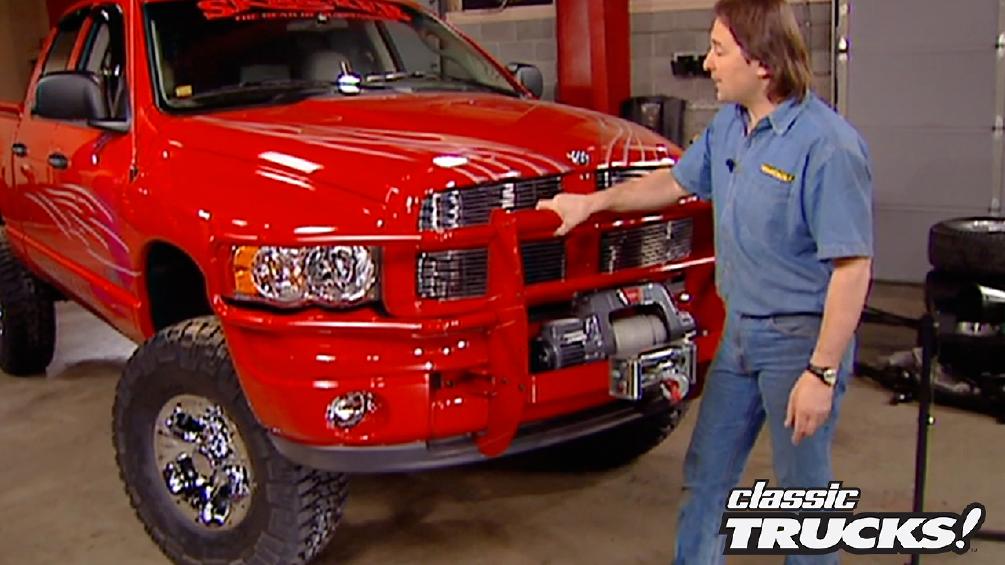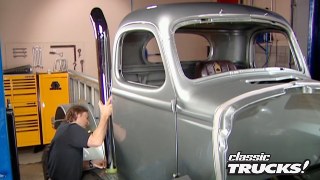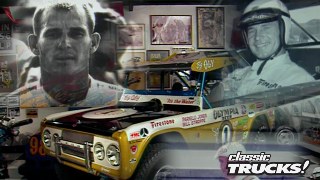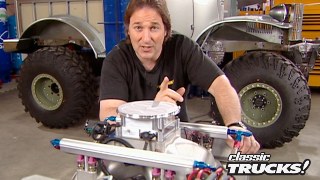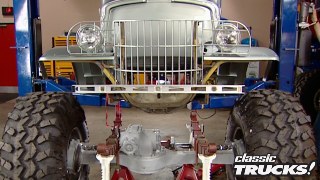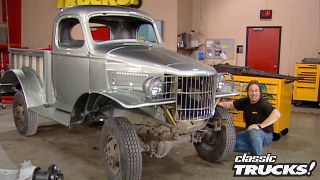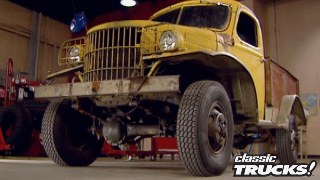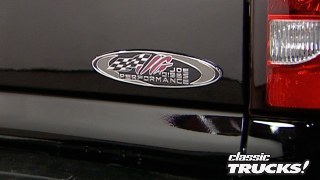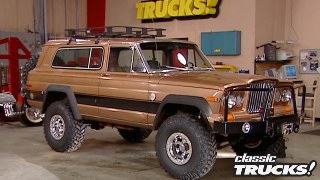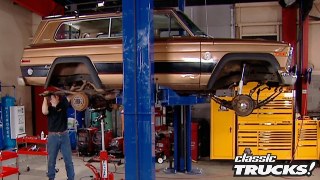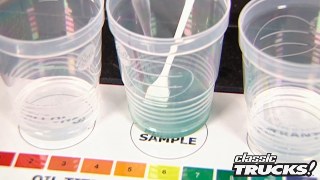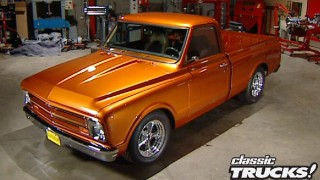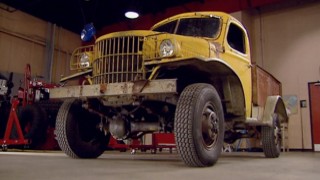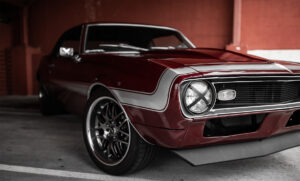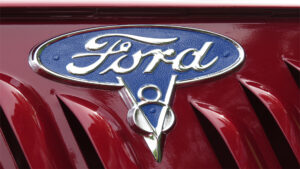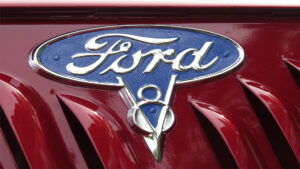Classic Trucks! Builds
Want more content like this?
Join the PowerNation Email NewsletterEpisode Transcript
Welcome to trucks. You know, I've been getting a lot of questions from you Dodge fans lately wondering when I'm gonna do something with one of these new Dodge trucks.
They got that big in your face styling. They're just begging to have a big lift and tires put on them.
Unfortunately, whenever a manufacturer comes out with a new body style or heck even makes changes to an existing one,
you gotta wait a little bit for the aftermarket to catch up, make some cool parts for it. Well, for you Dodge fans,
the wait is over because the parts are starting to roll in. So take a good look at this stock Dodge Ram four wheel drive
because today I'm gonna show you how to lift it six inches put on those huge 37 inch tall tires. Whoa, whoa, whoa, come back back. Not yet. First things first.
That means getting the truck up in the air, taking off the tires,
the skid plates,
the exhaust crossover pipe
and the front drive shaft.
Ok. Like most four by fours with an independent front suspension.
This one uses torsion bars to get it spring in the front and those need to come out.
So the first thing I did was make some good marks on the bar, so I'll be able to get it back to exactly the same tension when I reinstall the barss.
Now using a special puller, unload the bar.
If you don't have one of these pullers, you can rent one at most auto parts stores.
Then with the bars out of the way,
follow it with the cross number.
All right,
before I finish disassembling the front,
let me show you the kit that we're gonna use. Now, we got this from Skyjacker and you get the complete lift in the rear with new springs. But the front,
uh, you've got skid plates, shocks, cross members, brackets, hardware, new steering knuckles. You've got everything to lift that front end six inches.
Now notice there is no new front drive shaft.
Usually when you lift an independent this high, you need a new front drive shaft.
Now, Skyjacker designed this kit where you can use your stock drive shaft,
but that's where this indexing ring comes in more on this. Later on.
Moving on with the disassembly,
we need to get this knuckle off of here. Now, to do that,
take off your tie rod ends, sway bar end links, take out your shocks, take off the brake caliper and the rotor
then knock loose your ball joints,
take off the knuckle.
Now you can really start to see the difference between the stock steering knuckle and this huge skyjacker one. And what a difference. Now, not only is this stronger and taller but notice a different mounting point for the tie rod end. Now, this is important because this will keep your steering from getting in a bind. Now, while I'm here, I'm gonna go ahead and take off this hub bearing assembly
and put it on the new knuckle.
The last thing to take off is the lower a arm
followed by the rear cross member.
Ok? Before we can start putting on any new stuff, we need to do something about this differential. Now, if all we were doing was lowering our suspension mounting points.
Well, that wouldn't be good enough. That would put our drive axles in an insane angle, bind them up and destroy them. So
the whole differentials got to come down too. Now, the kit comes with three mounting brackets for the three mounting points.
Now we're ready to dig into that table of new parts.
We're gonna start with the new front cross member and it just slides into the old front A R pockets.
We'll follow that up by Bolton on the rear cross member using the supplied hardware.
Next comes the new bump stop and there's quite a bit of difference here.
Bolt the stock a arm into the new cross members. Now notice how they've dropped the mounting point from here down to here.
Follow that with a new massive knuckles. Now, these knuckles work in conjunction with the lower a arm to give us six inches of lift. Now, just hook up your
tie rod ends.
Now, all you have to do is reinstall the rotor
and the caliper. Now, since we didn't have to disconnect the caliper, we don't even have to bleed the brakes. Now, I know this brake line is tight
to fix that. All you have to do is move the line support on the frame down to this lower hole
and that will give you enough slack.
Finally
slide in the new shocks.
Yeah,
moving under the truck, it is time for this indexing ring. And like I said before, this little guy is gonna allow us to reuse our stock front drive shaft.
Here's how it works.
It'll rotate our transfer case down
that will lower our front output shaft and line it back up with the front pinion. Now, unfortunately, that means, yeah, you guessed it transfer case has to come out. But wait, wait before you get too nervous, it's not that hard. All you have to do is take out the rear drive shaft, unhook some electrical and some vents
and six bolts
transfer case will come out, I promise
bolt the ring onto the transfer case,
then take this adapter
and lightly tap it into the back of the transmission
with a new seal
with the ring in place. Our output shaft is right where it needs to be.
All right, moving to the rear of the vehicle, to the other side of the transfer case.
We've got these drop brackets for the torsion bar cross member
and they slide right up here into the frame in the stock location
and go on with the stock bolts,
reinstall. The original cross member
followed
by the torsion bars,
then tighten them up according to the marks and the measurements that you made earlier.
As you can see, this is not that hard for an independent front suspension and it just gets easier from here on out because most of the hard stuff is done and I'm gonna prove that to you after the break.
Welcome back. We are going big today with a new Dodge Ram showing you how to lift it six inches and put on a 37 inch tall tire. Now, we're already deep into the install on the front, have dealt with the differential, the steering knuckles and the transfer case.
Now we're gonna finish it up so we can move on to the rear.
As you probably know, most trucks come with some sort of a factory skid plate.
Let me rephrase that they come with some sort of a plastic shroud thing that
is in no way strong enough to do any four wheeling with.
You'll tear something like this off so quick, you won't believe it
since the whole purpose of this kit is to make that truck more capable off road. Skyjackers got their own version of the skid plate.
Now, these are thick steel, front and rear plates
and the brackets to support them. We're gonna bolt these on. First,
they bolt here between the new front and rear cross members.
Then we'll follow that up with the lower skid plate,
the upper skid plate bracket bolts to the frame rail.
Finally, the front skid plate goes on last
and that
will give us some real protection.
Ok. One problem that you can run into when you lift an independent front suspension
is because you've lowered everything down.
That creates more leverage. You take a hard impact on the front boom that can buckle that whole suspension up underneath.
So to prevent that,
you've got these kicker braces. Now, these run from the rear cross member to the transmission cross member, they strengthen the front prevent that from happening. Now, we've already installed the front brackets,
the rear brackets, bolts on using existing holes,
then bolt the braces in, make sure you use some grease on the bushings. So they don't squeak on you.
The only real modification that you have to do when you're putting on this kit is to your exhaust crossover pipe. Now, here's a stock pipe runs down from the driver's side
under the front drive shaft and over to the passenger side. Now, remember we have dropped our front drive shaft so this pipe is not gonna work anymore. Now, here's what Skyjacker recommends
take your pipe cut, the ends off
and then custom bend up a centerpiece that goes over the top of the drive shaft, then weld your ends back on. Now, this works really well. Unfortunately, it doesn't come with a kit. You're on your own for this one.
But if you don't have the tools to do this, you don't have a welder or tubing bender.
Any competent muffler shop can do this in about an hour's time.
Now, speaking of time, you've got about three minutes to take a break, do what you need to do and get back here and don't get sidetracked because if you do,
you're gonna miss the payoff of what this thing is gonna look like. And that would be a shame.
Just can't get enough of trucks, check us out online at trucks, tv.com.
Hey, welcome back. Just tune in on the bike here. Yeah,
this is the same bike I teased you with last week and I'm gonna tell you all about it today,
but not yet. First, we got a Dodge to finish up.
Ok. The front of our new dodge is now sitting six inches higher.
Now it's time to jack up the rear. So the truck will set level. Now, the first thing I did was stick a jack under the rear end, took off the shocks unbolted the U bolts. Now I can just lower the axle out of the way
with the stock springs unbolted. You can add those to the swap
meat pile.
Now we're ready for these new springs. But before I put them on, let's take a good look at them. Not only are the arched to give us our complete lift. Don't have to use any lift blocks, but they also come with a factory style overload spring
and this built in wedge and that'll correct your opinion angle. So you don't have vibration problems. Of course, they come with new U bolts
and the best part is these slide right into the stock location,
using the factory bolts
with the new springs in place,
just bolt on the new shocks
and that takes care of the rear. Now, was that simple or what?
All right, let's go look at some wheels and tires
like I said before, we're putting 30 sevens on this thing.
So let's take a look at those first. This is the Goodyear Wrangler, MTR. You've seen them before
and they are one of the best off road tires on the market.
They will roll right over mud, rock sand and the heck you name it.
But as good as they are off road. What's really surprising is how good they are on the highway. This is a very versatile tire. Now, the size 37 inches tall, 12.5 inches wide, 17 inch rim. Now, speaking of rim, what are we gonna put in there?
Well, a good tire needs a good wheel. So for those, we went to K MC wheel company got a set of what they call the tank. Now, like the name implies, these are extremely strong,
they're a five spoke design,
but the shape of the spokes, the cut of the windows, the styling is pure K MC.
Now, the size we're using is 17 by eight with a four inch back space. Perfect to fit those tires on that dodge.
And there it is a new Dodge Ram with a whole new look or attitude.
However you look at it. This is a nice truck. The lift, the tires really bring out the old power wagon influence in the new body style. And that's always a good thing. Now, we've got us a truck. All right, a couple of things. Any time you do suspension work, you need to get it to an alignment shop before you drive it much because you don't wanna mess up those new tires. Also gonna put the difficulty meter little over half because it's not that difficult. But there are some special tools involved.
However, this is something that a competent weekend mechanic or do it yourself or can realistically tackle and do without throwing wrenches at the wall.
Oh, yeah, one more thing. It seems like everybody's making stuff for four by fours lately
and the oil companies, they're no exception.
This is Quaker State four by four synthetic blend motor oil. This stuff is made specifically for the heavy loads and the
general abuse that us four wheelers do to our rigs.
Pretty cool. Check it out.
Yeah, it's about time we got our own oil
if you watch trucks very often. Well, you've no doubt, seen me do a lot with four wheel drive vehicles, trucks. Jeeps, blazers, Broncos, et cetera, et cetera.
But a lot of, you may not realize that big rigs. Most of them are four wheel drive, but not the way you're thinking front axle doesn't get power, both rear axles get power. Now, look at this,
you have a drive shaft running out the back of the front differential, powering the rear.
So what's the deal with that? How does that work? Well, we're at Wyotech where they've got more rear ends than a
Baywatch marathon. We're gonna show you how it works,
how it works
brought to you by Wyotech.
All right, Chad, we got a tandem axle truck, both axles drive. How is that possible?
Well, the, the key is with the front differential, it serves two purposes. Not only does it have to drive the front axle but somehow it has to get power back to this rear axle. I know we got some cool cutaways. Let's take a look at them.
Ok. Well, like, like we've discussed, power is gonna come into the front
and is gonna come into this unit right here, the power divider and that's where the power is gonna divide from this set of gears which will drop the power down
to drive the ring and pinion for the front axle
and at the same point in time is gonna send power down the through shaft to this yoke and eventually on down to the rear differential. Ok. Now, what is this, this is gonna be our locking unit that will allow us to lock them together? Ok.
Now, tell me about this ring and pin. This is not your average truck size here.
No, they make the components rather large so that we can get durability and long life out
and your axles
is about two inches in diameter. You don't break those too often,
not at all. All right, let's take a look at this other cutaway. It shows more what's going on inside here. Ok. Well, here's our power divider, what's inside that unit
and it's nothing more than your typical Spider Cross assembly.
Power is gonna be driving the Spider Cross and from there, power can go one of two places. It can either be sent to the front side gear and on to the rear differential like so
or it can turn around and drive the front axle
like so. Ok, what's really nice about this is we have the option to lock this together
to force both axles to drive at the same time. And at this point, you have a true four wheel drive. That's exactly right. Ok. Now, how, how about strength of components? Is this a weak spot or this uh Spider cross assembly by far is the most commonly replaced item?
Ok.
What, what causes those to break driver abuse is a big one like something. Maybe Mike Ryan would do exactly. Ok. Now, I assume your rear differential pretty standard that what you would see on a normal track,
just bigger. A lot bigger. Ok.
Hopefully that gives you an idea how a tandem axle set up works on a big rig. Who knows? You might even be able to use it on your next four wheel drive project.
It'd be heavy as heck. But I guarantee you're not gonna break any axles. But even if you don't, at least now, you know how this stuff works.
Oh, no, you don't. Come on up here. We got some parts to look at first. All right. Question for you.
What do you know about plumbing?
I'm not talking about the type that involves butt crack. I'm talking about plumbing for your truck. All right,
Earl's can help
out if you need some parts. Here's what they've got for hoses, got braided stainless steel and
they've got this Pro Light 350 which is half the weight of stainless steel,
but it'll still handle 350 P. Si now, for fittings, you can get the traditional style or black or polished
and for your cooling system, they've got this stuff called for
a Flex, which is a core irrigated stainless steel. You can bend into whatever shape you want
and it won't rust or corrode on you and only Earl's has it.
If you're lucky enough to own a newer Ford Lightning Flowmaster is about to make you smile because this is what they call their American thunder kit for the Ford lightning.
Now, it's basically a dual inlet, dual outlet Flowmaster Muffler,
dual tail pipes
and some really nice stainless steel tips. And this whole kit will go on in about two hours and that's if you're goofing around. So if you want your lightning to really rumble, this is the kit to do it now about that bike,
it's built by honest Charlie speed shop. And the first thing that really grabs your attention is the tank with these wicked flames on it.
But also it's how wide it is. Now, there's a reason for that
because under this leather cover here in the center
is a single vintage carburetor
that sits on an equally vintage Ford flathead V8.
That's right. A flathead V8
and these engines were built by Ford from 1937 to 1940
honest, Charlie takes them,
rebuilds them, upgrades the ignition and the fuel system, so they're more reliable
and then suspends it all between two wheels.
Now, since flatheads were notorious for overheating, a
custom radiator with an overflow tank was designed
and an electric fan was added so you can idle in traffic all day long and not boil over.
The drive train is unique as it uses a stock clutch to transfer power from the engine
to a direct drive gearbox which then runs a chain down to the rear wheel, which means no shifting. Now, while this makes for a really cool cruiser,
it does eliminate the joy of ripping through the gears or doing a nice smoky burnout.
The styling just like the engine is pure nostalgia. The batteries hidden under the low slung leather seat.
You got a custom hard tail frame,
drum brake in the rear black painted spoke wheels and of course, a Bob Dr
f
this bike is surprisingly stable on the road and it's nimble enough to get in and out of traffic pretty easy.
The reason is the engine's not too big to overwhelm the bike
but
make no mistake. This is a hot rodder's bike.
It smells like gas and oil.
It'll drip a little oil.
Uh,
it's perfect.
Now, since most guys that are into trucks are also into bikes, you'll be glad to know that you can buy one of these bad boys from on
Charlie's. Now, some of you might be thinking, well, that's cool. But,
and nothing sounds like a Harley and you're right. Nothing sounds like a Harley. But then again,
nothing sounds like a flathead through straight pipes either.
Show Full Transcript
They got that big in your face styling. They're just begging to have a big lift and tires put on them.
Unfortunately, whenever a manufacturer comes out with a new body style or heck even makes changes to an existing one,
you gotta wait a little bit for the aftermarket to catch up, make some cool parts for it. Well, for you Dodge fans,
the wait is over because the parts are starting to roll in. So take a good look at this stock Dodge Ram four wheel drive
because today I'm gonna show you how to lift it six inches put on those huge 37 inch tall tires. Whoa, whoa, whoa, come back back. Not yet. First things first.
That means getting the truck up in the air, taking off the tires,
the skid plates,
the exhaust crossover pipe
and the front drive shaft.
Ok. Like most four by fours with an independent front suspension.
This one uses torsion bars to get it spring in the front and those need to come out.
So the first thing I did was make some good marks on the bar, so I'll be able to get it back to exactly the same tension when I reinstall the barss.
Now using a special puller, unload the bar.
If you don't have one of these pullers, you can rent one at most auto parts stores.
Then with the bars out of the way,
follow it with the cross number.
All right,
before I finish disassembling the front,
let me show you the kit that we're gonna use. Now, we got this from Skyjacker and you get the complete lift in the rear with new springs. But the front,
uh, you've got skid plates, shocks, cross members, brackets, hardware, new steering knuckles. You've got everything to lift that front end six inches.
Now notice there is no new front drive shaft.
Usually when you lift an independent this high, you need a new front drive shaft.
Now, Skyjacker designed this kit where you can use your stock drive shaft,
but that's where this indexing ring comes in more on this. Later on.
Moving on with the disassembly,
we need to get this knuckle off of here. Now, to do that,
take off your tie rod ends, sway bar end links, take out your shocks, take off the brake caliper and the rotor
then knock loose your ball joints,
take off the knuckle.
Now you can really start to see the difference between the stock steering knuckle and this huge skyjacker one. And what a difference. Now, not only is this stronger and taller but notice a different mounting point for the tie rod end. Now, this is important because this will keep your steering from getting in a bind. Now, while I'm here, I'm gonna go ahead and take off this hub bearing assembly
and put it on the new knuckle.
The last thing to take off is the lower a arm
followed by the rear cross member.
Ok? Before we can start putting on any new stuff, we need to do something about this differential. Now, if all we were doing was lowering our suspension mounting points.
Well, that wouldn't be good enough. That would put our drive axles in an insane angle, bind them up and destroy them. So
the whole differentials got to come down too. Now, the kit comes with three mounting brackets for the three mounting points.
Now we're ready to dig into that table of new parts.
We're gonna start with the new front cross member and it just slides into the old front A R pockets.
We'll follow that up by Bolton on the rear cross member using the supplied hardware.
Next comes the new bump stop and there's quite a bit of difference here.
Bolt the stock a arm into the new cross members. Now notice how they've dropped the mounting point from here down to here.
Follow that with a new massive knuckles. Now, these knuckles work in conjunction with the lower a arm to give us six inches of lift. Now, just hook up your
tie rod ends.
Now, all you have to do is reinstall the rotor
and the caliper. Now, since we didn't have to disconnect the caliper, we don't even have to bleed the brakes. Now, I know this brake line is tight
to fix that. All you have to do is move the line support on the frame down to this lower hole
and that will give you enough slack.
Finally
slide in the new shocks.
Yeah,
moving under the truck, it is time for this indexing ring. And like I said before, this little guy is gonna allow us to reuse our stock front drive shaft.
Here's how it works.
It'll rotate our transfer case down
that will lower our front output shaft and line it back up with the front pinion. Now, unfortunately, that means, yeah, you guessed it transfer case has to come out. But wait, wait before you get too nervous, it's not that hard. All you have to do is take out the rear drive shaft, unhook some electrical and some vents
and six bolts
transfer case will come out, I promise
bolt the ring onto the transfer case,
then take this adapter
and lightly tap it into the back of the transmission
with a new seal
with the ring in place. Our output shaft is right where it needs to be.
All right, moving to the rear of the vehicle, to the other side of the transfer case.
We've got these drop brackets for the torsion bar cross member
and they slide right up here into the frame in the stock location
and go on with the stock bolts,
reinstall. The original cross member
followed
by the torsion bars,
then tighten them up according to the marks and the measurements that you made earlier.
As you can see, this is not that hard for an independent front suspension and it just gets easier from here on out because most of the hard stuff is done and I'm gonna prove that to you after the break.
Welcome back. We are going big today with a new Dodge Ram showing you how to lift it six inches and put on a 37 inch tall tire. Now, we're already deep into the install on the front, have dealt with the differential, the steering knuckles and the transfer case.
Now we're gonna finish it up so we can move on to the rear.
As you probably know, most trucks come with some sort of a factory skid plate.
Let me rephrase that they come with some sort of a plastic shroud thing that
is in no way strong enough to do any four wheeling with.
You'll tear something like this off so quick, you won't believe it
since the whole purpose of this kit is to make that truck more capable off road. Skyjackers got their own version of the skid plate.
Now, these are thick steel, front and rear plates
and the brackets to support them. We're gonna bolt these on. First,
they bolt here between the new front and rear cross members.
Then we'll follow that up with the lower skid plate,
the upper skid plate bracket bolts to the frame rail.
Finally, the front skid plate goes on last
and that
will give us some real protection.
Ok. One problem that you can run into when you lift an independent front suspension
is because you've lowered everything down.
That creates more leverage. You take a hard impact on the front boom that can buckle that whole suspension up underneath.
So to prevent that,
you've got these kicker braces. Now, these run from the rear cross member to the transmission cross member, they strengthen the front prevent that from happening. Now, we've already installed the front brackets,
the rear brackets, bolts on using existing holes,
then bolt the braces in, make sure you use some grease on the bushings. So they don't squeak on you.
The only real modification that you have to do when you're putting on this kit is to your exhaust crossover pipe. Now, here's a stock pipe runs down from the driver's side
under the front drive shaft and over to the passenger side. Now, remember we have dropped our front drive shaft so this pipe is not gonna work anymore. Now, here's what Skyjacker recommends
take your pipe cut, the ends off
and then custom bend up a centerpiece that goes over the top of the drive shaft, then weld your ends back on. Now, this works really well. Unfortunately, it doesn't come with a kit. You're on your own for this one.
But if you don't have the tools to do this, you don't have a welder or tubing bender.
Any competent muffler shop can do this in about an hour's time.
Now, speaking of time, you've got about three minutes to take a break, do what you need to do and get back here and don't get sidetracked because if you do,
you're gonna miss the payoff of what this thing is gonna look like. And that would be a shame.
Just can't get enough of trucks, check us out online at trucks, tv.com.
Hey, welcome back. Just tune in on the bike here. Yeah,
this is the same bike I teased you with last week and I'm gonna tell you all about it today,
but not yet. First, we got a Dodge to finish up.
Ok. The front of our new dodge is now sitting six inches higher.
Now it's time to jack up the rear. So the truck will set level. Now, the first thing I did was stick a jack under the rear end, took off the shocks unbolted the U bolts. Now I can just lower the axle out of the way
with the stock springs unbolted. You can add those to the swap
meat pile.
Now we're ready for these new springs. But before I put them on, let's take a good look at them. Not only are the arched to give us our complete lift. Don't have to use any lift blocks, but they also come with a factory style overload spring
and this built in wedge and that'll correct your opinion angle. So you don't have vibration problems. Of course, they come with new U bolts
and the best part is these slide right into the stock location,
using the factory bolts
with the new springs in place,
just bolt on the new shocks
and that takes care of the rear. Now, was that simple or what?
All right, let's go look at some wheels and tires
like I said before, we're putting 30 sevens on this thing.
So let's take a look at those first. This is the Goodyear Wrangler, MTR. You've seen them before
and they are one of the best off road tires on the market.
They will roll right over mud, rock sand and the heck you name it.
But as good as they are off road. What's really surprising is how good they are on the highway. This is a very versatile tire. Now, the size 37 inches tall, 12.5 inches wide, 17 inch rim. Now, speaking of rim, what are we gonna put in there?
Well, a good tire needs a good wheel. So for those, we went to K MC wheel company got a set of what they call the tank. Now, like the name implies, these are extremely strong,
they're a five spoke design,
but the shape of the spokes, the cut of the windows, the styling is pure K MC.
Now, the size we're using is 17 by eight with a four inch back space. Perfect to fit those tires on that dodge.
And there it is a new Dodge Ram with a whole new look or attitude.
However you look at it. This is a nice truck. The lift, the tires really bring out the old power wagon influence in the new body style. And that's always a good thing. Now, we've got us a truck. All right, a couple of things. Any time you do suspension work, you need to get it to an alignment shop before you drive it much because you don't wanna mess up those new tires. Also gonna put the difficulty meter little over half because it's not that difficult. But there are some special tools involved.
However, this is something that a competent weekend mechanic or do it yourself or can realistically tackle and do without throwing wrenches at the wall.
Oh, yeah, one more thing. It seems like everybody's making stuff for four by fours lately
and the oil companies, they're no exception.
This is Quaker State four by four synthetic blend motor oil. This stuff is made specifically for the heavy loads and the
general abuse that us four wheelers do to our rigs.
Pretty cool. Check it out.
Yeah, it's about time we got our own oil
if you watch trucks very often. Well, you've no doubt, seen me do a lot with four wheel drive vehicles, trucks. Jeeps, blazers, Broncos, et cetera, et cetera.
But a lot of, you may not realize that big rigs. Most of them are four wheel drive, but not the way you're thinking front axle doesn't get power, both rear axles get power. Now, look at this,
you have a drive shaft running out the back of the front differential, powering the rear.
So what's the deal with that? How does that work? Well, we're at Wyotech where they've got more rear ends than a
Baywatch marathon. We're gonna show you how it works,
how it works
brought to you by Wyotech.
All right, Chad, we got a tandem axle truck, both axles drive. How is that possible?
Well, the, the key is with the front differential, it serves two purposes. Not only does it have to drive the front axle but somehow it has to get power back to this rear axle. I know we got some cool cutaways. Let's take a look at them.
Ok. Well, like, like we've discussed, power is gonna come into the front
and is gonna come into this unit right here, the power divider and that's where the power is gonna divide from this set of gears which will drop the power down
to drive the ring and pinion for the front axle
and at the same point in time is gonna send power down the through shaft to this yoke and eventually on down to the rear differential. Ok. Now, what is this, this is gonna be our locking unit that will allow us to lock them together? Ok.
Now, tell me about this ring and pin. This is not your average truck size here.
No, they make the components rather large so that we can get durability and long life out
and your axles
is about two inches in diameter. You don't break those too often,
not at all. All right, let's take a look at this other cutaway. It shows more what's going on inside here. Ok. Well, here's our power divider, what's inside that unit
and it's nothing more than your typical Spider Cross assembly.
Power is gonna be driving the Spider Cross and from there, power can go one of two places. It can either be sent to the front side gear and on to the rear differential like so
or it can turn around and drive the front axle
like so. Ok, what's really nice about this is we have the option to lock this together
to force both axles to drive at the same time. And at this point, you have a true four wheel drive. That's exactly right. Ok. Now, how, how about strength of components? Is this a weak spot or this uh Spider cross assembly by far is the most commonly replaced item?
Ok.
What, what causes those to break driver abuse is a big one like something. Maybe Mike Ryan would do exactly. Ok. Now, I assume your rear differential pretty standard that what you would see on a normal track,
just bigger. A lot bigger. Ok.
Hopefully that gives you an idea how a tandem axle set up works on a big rig. Who knows? You might even be able to use it on your next four wheel drive project.
It'd be heavy as heck. But I guarantee you're not gonna break any axles. But even if you don't, at least now, you know how this stuff works.
Oh, no, you don't. Come on up here. We got some parts to look at first. All right. Question for you.
What do you know about plumbing?
I'm not talking about the type that involves butt crack. I'm talking about plumbing for your truck. All right,
Earl's can help
out if you need some parts. Here's what they've got for hoses, got braided stainless steel and
they've got this Pro Light 350 which is half the weight of stainless steel,
but it'll still handle 350 P. Si now, for fittings, you can get the traditional style or black or polished
and for your cooling system, they've got this stuff called for
a Flex, which is a core irrigated stainless steel. You can bend into whatever shape you want
and it won't rust or corrode on you and only Earl's has it.
If you're lucky enough to own a newer Ford Lightning Flowmaster is about to make you smile because this is what they call their American thunder kit for the Ford lightning.
Now, it's basically a dual inlet, dual outlet Flowmaster Muffler,
dual tail pipes
and some really nice stainless steel tips. And this whole kit will go on in about two hours and that's if you're goofing around. So if you want your lightning to really rumble, this is the kit to do it now about that bike,
it's built by honest Charlie speed shop. And the first thing that really grabs your attention is the tank with these wicked flames on it.
But also it's how wide it is. Now, there's a reason for that
because under this leather cover here in the center
is a single vintage carburetor
that sits on an equally vintage Ford flathead V8.
That's right. A flathead V8
and these engines were built by Ford from 1937 to 1940
honest, Charlie takes them,
rebuilds them, upgrades the ignition and the fuel system, so they're more reliable
and then suspends it all between two wheels.
Now, since flatheads were notorious for overheating, a
custom radiator with an overflow tank was designed
and an electric fan was added so you can idle in traffic all day long and not boil over.
The drive train is unique as it uses a stock clutch to transfer power from the engine
to a direct drive gearbox which then runs a chain down to the rear wheel, which means no shifting. Now, while this makes for a really cool cruiser,
it does eliminate the joy of ripping through the gears or doing a nice smoky burnout.
The styling just like the engine is pure nostalgia. The batteries hidden under the low slung leather seat.
You got a custom hard tail frame,
drum brake in the rear black painted spoke wheels and of course, a Bob Dr
f
this bike is surprisingly stable on the road and it's nimble enough to get in and out of traffic pretty easy.
The reason is the engine's not too big to overwhelm the bike
but
make no mistake. This is a hot rodder's bike.
It smells like gas and oil.
It'll drip a little oil.
Uh,
it's perfect.
Now, since most guys that are into trucks are also into bikes, you'll be glad to know that you can buy one of these bad boys from on
Charlie's. Now, some of you might be thinking, well, that's cool. But,
and nothing sounds like a Harley and you're right. Nothing sounds like a Harley. But then again,
nothing sounds like a flathead through straight pipes either.
